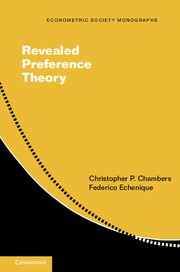Book contents
- Frontmatter
- Dedication
- Contents
- Preface
- 1 Mathematical Preliminaries
- 2 Classical Abstract Choice Theory
- 3 Rational Demand
- 4 Topics in Rational Demand
- 5 Practical Issues in Revealed Preference Analysis
- 6 Production
- 7 Stochastic Choice
- 8 Choice Under Uncertainty
- 9 General Equilibrium Theory
- 10 Game Theory
- 11 Social Choice and Political Science
- 12 Revealed Preference and Systems of Polynomial Inequalities
- 13 Revealed Preference and Model Theory
- References
- Index
- Miscellaneous Endmatter
12 - Revealed Preference and Systems of Polynomial Inequalities
Published online by Cambridge University Press: 05 January 2016
- Frontmatter
- Dedication
- Contents
- Preface
- 1 Mathematical Preliminaries
- 2 Classical Abstract Choice Theory
- 3 Rational Demand
- 4 Topics in Rational Demand
- 5 Practical Issues in Revealed Preference Analysis
- 6 Production
- 7 Stochastic Choice
- 8 Choice Under Uncertainty
- 9 General Equilibrium Theory
- 10 Game Theory
- 11 Social Choice and Political Science
- 12 Revealed Preference and Systems of Polynomial Inequalities
- 13 Revealed Preference and Model Theory
- References
- Index
- Miscellaneous Endmatter
Summary
It should be apparent by now that systems of linear inequalities emerge naturally in revealed preference theory. They constitute the essence of Afriat's Theorem, for example; and we formulated revealed preference problems using systems of linear inequalities in Chapters 3, 6, 7, and 8. In this chapter, we describe how revealed preference problems can generally be understood as a system of inequalities. From a purely computational perspective, one can very often solve a revealed preference problem by algorithmically solving the corresponding system of inequalities.
When the system of inequalities is linear, the problem is easy to solve both computationally and analytically. Here we develop a GARP-like acyclicity test (similar to the ones in Chapters 2 and 3). The test will follow from the linearity of the system of inequalities embodied in the revealed preference question.
We shall discuss an extension of the linear theory to systems of polynomial inequalities. The theory of polynomial inequalities will be seen to be very relevant for revealed preference theory (but harder to work with compared to the theory of linear inequalities).
LINEAR INEQUALITIES: THE THEOREM OF THE ALTERNATIVE AND REVEALED PREFERENCE
We start by revisiting the Theorem of the Alternative, or Farkas’ Lemma from Chapter 1. It is easy to see why it is useful in revealed preference theory. We then discuss some sources of linear systems for popular models in economics. The following is a bit weaker than Lemma 1.13. It is written so as to emphasize that the lemma can be used to “remove existential quantifiers;” it states that an existential statement (one that start with “there is… ”) is equivalent to a universal statement (one that starts with “for all… ”). Note that the discussion of the Tarski–Seidenberg Theorem in Chapter 9 is also about removing existential quantifiers.
Lemma 1.13'(Integer–Real Farkas) Let ﹛Ai﹜i=1M be a finite collection of vectors inQK. The following statements are equivalent:
I) There exists y ∈ RK such that for all i = 1, …, M, Ai. y > 0.
II) For all z ∈ Z+M \ ﹛0﹜, it holds that.
- Type
- Chapter
- Information
- Revealed Preference Theory , pp. 175 - 185Publisher: Cambridge University PressPrint publication year: 2016



